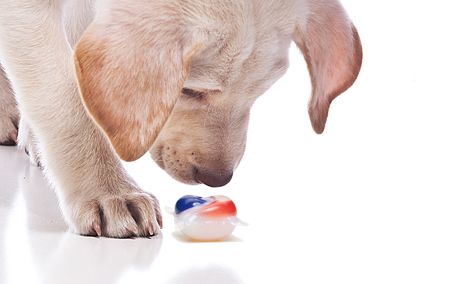Laundry detergent pods, a concern for kids, can harm pets too
Advise your veterinary clients about this hazardand when they need to seek your help.
Most soaps and detergents contain chemicals called ionic and anionic surfactants. When pets ingest a small amount of such products, it's possible for them to respond to the unpleasant taste or to have mild, self-limiting gastrointestinal upset (drooling, vomiting and diarrhea).
However, a new danger seems to be presenting itself. It was first noticed that young children were developing serious respiratory issues after biting into the highly concentrated, prepackaged laundry detergent pods (some that look like candy and come in brightly colored packages-read about a recently released study here).

Laundry detergent pods, which look like candy and have been in the news as a hazard to children, are dangerous to pets too. (Note: This image is Photoshopped.)
Not surprisingly, Pet Poison Helpline has noticed some severe clinical signs in dogs and cats exposed to these pods as well. Of the cases reported to the Pet Poison Helpline over the past two years, 72 percent of pets developed clinical signs. In order of prevalence, 84 percent of symptomatic cases experienced vomiting, 21 percent experienced cough, 17 percent experienced lethargy and 13 percent experienced dyspnea, wheezing or other respiratory irritation.
So why do pets exposed to laundry pods experience more severe reactions than pets that simply lick the product off the floor or their fur? The reason is thought to be the way the product is formulated in the pod. When a pet bites into a pod, the product is both highly concentrated and under pressure from the bite. Therefore when the pod is punctured, the detergents are forcefully expelled and may be easily aspirated or swallowed, often in large amounts. Theoretically, ingestion of multiple packets also poses a risk for a foreign body obstruction and erosive lesions from prolonged contact in the gut. (One note: Dishwasher pods are also a risk to pets, with a greater potential for corrosive injury.)
When these exposures occur, it is important for the pet owner to dilute the exposed site as much as possible-to rinse the mouth, skin or eyes until the slick, “soapy” feel is gone. Any persistent vomiting or respiratory signs should be evaluated by a veterinarian immediately. In the clinic, veterinarians should evaluate patients with respiratory abnormalities for aspiration. There is no antidote for laundry pod exposure, so any persistent clinical signs should be treated with symptomatic and supportive care. Consultation with a pet poison control center is recommended after ingestion of pod contents or in the case of a severely symptomatic patient.
Dr. Heather Handley is a veterinarian with Pet Poison Helpline.
FDA approves oral drug for broad canine protection against parasites
October 7th 2024Elanco's lotilaner, moxidectin, praziquantel, and pyrantel chewable tablets (Credelio Quattro) provide a single monthly dose for protection against fleas, ticks, heartworms, roundworms, hookworms, and 3 species of tapeworm.
Read More
dvm360 announces winners of the Veterinary Heroes program
Published: September 6th 2024 | Updated: November 5th 2024This year’s event is supported by corporate sponsor Schwarzman Animal Medical Center and category sponsors Blue Buffalo Natural, MedVet, Banfield Pet Hospital, Thrive Pet Healthcare and PRN Pharmacal.
Read More